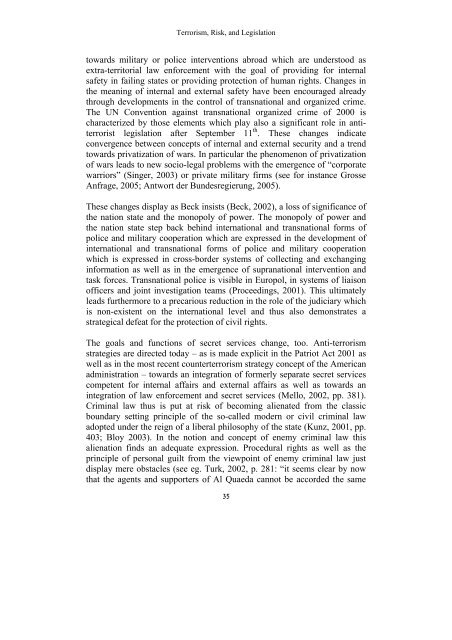222467to222472
222467to222472
222467to222472
You also want an ePaper? Increase the reach of your titles
YUMPU automatically turns print PDFs into web optimized ePapers that Google loves.
Terrorism, Risk, and Legislation<br />
towards military or police interventions abroad which are understood as<br />
extra-territorial law enforcement with the goal of providing for internal<br />
safety in failing states or providing protection of human rights. Changes in<br />
the meaning of internal and external safety have been encouraged already<br />
through developments in the control of transnational and organized crime.<br />
The UN Convention against transnational organized crime of 2000 is<br />
characterized by those elements which play also a significant role in antiterrorist<br />
legislation after September 11 th . These changes indicate<br />
convergence between concepts of internal and external security and a trend<br />
towards privatization of wars. In particular the phenomenon of privatization<br />
of wars leads to new socio-legal problems with the emergence of “corporate<br />
warriors” (Singer, 2003) or private military firms (see for instance Grosse<br />
Anfrage, 2005; Antwort der Bundesregierung, 2005).<br />
These changes display as Beck insists (Beck, 2002), a loss of significance of<br />
the nation state and the monopoly of power. The monopoly of power and<br />
the nation state step back behind international and transnational forms of<br />
police and military cooperation which are expressed in the development of<br />
international and transnational forms of police and military cooperation<br />
which is expressed in cross-border systems of collecting and exchanging<br />
information as well as in the emergence of supranational intervention and<br />
task forces. Transnational police is visible in Europol, in systems of liaison<br />
officers and joint investigation teams (Proceedings, 2001). This ultimately<br />
leads furthermore to a precarious reduction in the role of the judiciary which<br />
is non-existent on the international level and thus also demonstrates a<br />
strategical defeat for the protection of civil rights.<br />
The goals and functions of secret services change, too. Anti-terrorism<br />
strategies are directed today – as is made explicit in the Patriot Act 2001 as<br />
well as in the most recent counterterrorism strategy concept of the American<br />
administration – towards an integration of formerly separate secret services<br />
competent for internal affairs and external affairs as well as towards an<br />
integration of law enforcement and secret services (Mello, 2002, pp. 381).<br />
Criminal law thus is put at risk of becoming alienated from the classic<br />
boundary setting principle of the so-called modern or civil criminal law<br />
adopted under the reign of a liberal philosophy of the state (Kunz, 2001, pp.<br />
403; Bloy 2003). In the notion and concept of enemy criminal law this<br />
alienation finds an adequate expression. Procedural rights as well as the<br />
principle of personal guilt from the viewpoint of enemy criminal law just<br />
display mere obstacles (see eg. Turk, 2002, p. 281: “it seems clear by now<br />
that the agents and supporters of Al Quaeda cannot be accorded the same<br />
35


